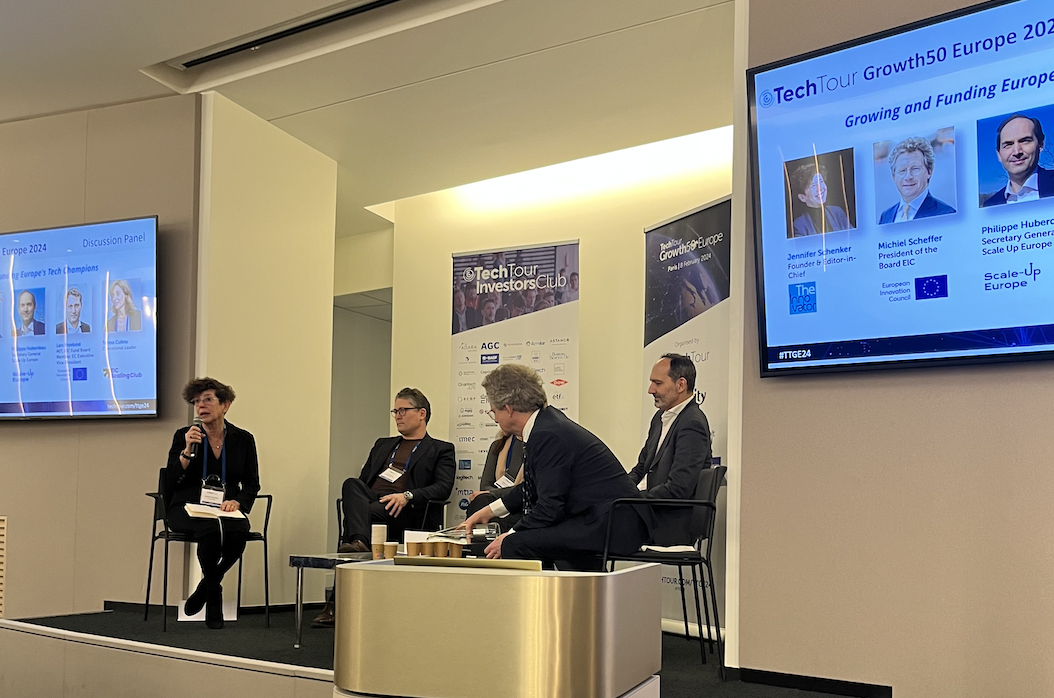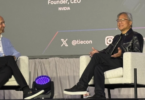Some 140 private equity and venture capital investors from across Europe met in Paris February 8 to discover the Continent’s deep tech talent and discuss how to better support and fund Europe’s tech champions.
Three scale-ups were awarded prizes at Tech Tour Growth50 Europe 2024: France’s SiPearl, which is developing a high-performance, low-power microprocessor that will be at the heart of European supercomputers, contributing to Europe’s technological sovereignty; DNA Script, a French life sciences technology company developing a new, faster, powerful, and versatile way to design and manufacture nucleic acids with the aim of making biology programmable; and UK-based Carbon Clean, which specializes in industrial carbon capture systems.
The Innovator’s Editor-in-Chief moderated a session entitled “Growing and Funding Europe’s Tech Champions (pictured here) with Michiel Scheffer, President of the Board of the European Commission’s European Innovation Council (EIC), Philippe Huberdeau, Secretary General Scale Up Europe at the Presidency of the French Republic, Lars Froelund, MIT, EIC Fund Board Member and a Special Advisor for Digital & Technological Sovereignty to European Executive Vice-President Margrethe Vestager, and Terera Cunha, Operational Leader at the EIC Scaling Club, a new EIC-funded curated community that brings together 100 European deep tech scale-ups with corporates and investors.
The Paris event was a kind of coming-out party for the EIC Scaling Club, which has already attracted a core group of corporates, including Shell, Bosch, Total, German and French car manufacturers, and semiconductor manufacturer ST, as members.
“The value for the corporates is to follow growth companies in ten different market segments,” says William Stevens, CEO of The Tech Tour and Leader of the EIC Scaling Club. “Each corporate typically joins three to five groups. Other advantages include forming relations with fellow Club members and key institutions and policymakers at European and EU member state levels. “
The goal of the EIC Funding Club is to tackle big societal needs and address new market opportunities in digital, mobility and transportation, health, energy and climate, materials and more. The top 100 European deep tech companies are selected from a pool of high-growth scale-ups that have benefited from EIC financial schemes and other European and national innovation programs. It seeks to grow the value of the deep tech companies by 40% with tailored coaching sessions, access to relevant business partners and investors.
Selected deep tech companies, such as SiPearl, have benefited from financial backing from the EIC Fund, the venture arm of the European Innovation Council (EIC). It was set up as a capital fund under private law with the European Commission as a shareholder to fund companies selected under the EIC Accelerator.With a budget of over €10 billion, the EIC’s goal is to strengthen Europe’s leadership in deep tech innovation by generating a pipeline of startups with the potential to become unicorns.
SiPearl, announced a €90 million A round last April which included a €2.5 million grant and up to €15 million in equity investments subscribed by the EIC Fund, aid from the French government, up to €25 million in convertible debt from the European Investment Bank as well as capital from Arm, a global leader in semiconductor design and silicon intellectual property development and Atos Group, through its Eviden business composed of Atos’ digital, big data and security.
While SiPearl’s funding is an example of how the size of funding rounds have grown in Europe, there is still a big gap with U.S. funding rounds. For example, Proxima Fusion, a German fusion company, which was spin-out of Max Planck IPP, raised just $7 million in its first funding round, whereas Commonwealth Fusion Systems, which was spin out of MIT in 2018, has raised a record $2 billion from investors.
Europe’s struggle to build global champions is not just about money, it is also about speed, Froelund said during the February 8 panel. The institutions tasked with doling out the money are too slow, and the processes are too complex, he said during the panel.
Marvel Fusion is a case in point. The German fusion company, one of the deep tech scale-ups that presented at the February 8 event in Paris, is partnering with Colorado State University to build the first laser facility dedicated to commercial fusion energy research. Marvel Fusion publicly stated that it chose to partner with Colorado State University rather than with an institution in Europe due to “speed.” The company said partnering with the U.S. facility was the most capital-efficient way to move forward, given the higher levels of private capital and government support available in the U.S.
There are, however, several European initiatives that point “in the right direction,” Marvel Fusion CEO Mortiz von der Linden told the Financial Times last August, citing the the UK government’s support for the fusion industry, France’s inclusion of fusion in its France 2030 program and Germany’s recent publication of its fusion study. “We see [the Colorado facility] as an important stepping stone to demonstrate the technology to then be able to build a power plant, but that doesn’t necessarily mean that this will be in the U.S. too,” von der Linden was quoted as saying. “It could very well, maybe hopefully, be in Europe.”
While acknowledging challenges, including the funding gap, panel members cited the progress the Continent’s deep tech sector has made in the last ten years. Government support of deep tech companies has increased. A growing number of deep tech accelerators in Europe are pairing researchers with experienced entrepreneurs to turn innovations into companies with go-to-market strategies. Universities such as the Technical University of Munich (TUM) and Sweden’s KTH are playing more active roles in spinning out companies. Some 20 ecosystem builders from 14 European countries – including TUM and KTH – have banded together in an organization called Rise Europe to support deep tech companies and, among other things, make it easier for companies to expand outside their home markets.
The EIC Scaling Club’s efforts are expected to help growth companies to connect with more growth capital, gain commitments from the large corporate clients they are targeting with their technologies and serve as a source of other types of support. “Too often entrepreneurs are left alone or under pressure from investors,” says Stevens. “We want the EIC Scaling Club to be a home for scale-ups to learn from each other and collaborate for success.”
The Innovator’s Editor-in-Chief is a member of the EIC Scaling Club’s advisory council. Other council members include Victoria Hernandez Valcarcel, Board of Directors (NED) at CaixaBank Payments and Consumer, Marie Wall, Deputy Director of the Swedish Ministry of Climate and Enterprise, Maria Zubeldia, Director of the Entrepreneurship Centre at the University of Oxford’s Saïd Business School, Branislav Vujovic, Partner at New Frontier Group, Dieter Kraft, Managing Director at Trumpf Ventures and Jan Goetz, CEO of IQM Quantum Computers.
IN OTHER NEWS THIS WEEK
DATA EXCHANGE
Dawex, Schneider Electric, Valeo, CEA and Prosyst Announce “Trusted Data Exchange Solution for Industry”
Five French companies – Dawex, Schneider Electric, Valeo, CEA and Prosyst – announced February 8 that they have created Data4Industry-X, an initiative that aims to enable global industrial organizations to innovate and operate services on distributed data, coming from various factories, organizations, or countries, while keeping control over the data. “The industry sector is a strategic pillar to the European and global economy,” said Laurent Lafaye, Dawex co-CEO. “Accelerating data exchange across trusted data spaces will definitely have a transformative impact on industrial organizations, driving innovation and responsible growth.” Awarded a Technology Pioneer by the World Economic Forum, Dawex is the initiator of an international standardization program on “Trusted Data Transaction”.
MANUFACTURING
Saudi Arabia Appoints Former Dell Executive To Head $100 Billion Venture Focused On Sustainable Manufacturing
Saudi Arabia announced the launch of Alat, a new venture backed by $100 billion in capital from a Public Investment Fund that aims to build a sustainable industrial and electronics hub in the country. Amit Midha, formerly president of Asia Pacific and Japan, Global Digital Cities at Dell Technologies, was named as chief executive officer of the new entity. Alat will focus on manufacturing products that serve local and international markets within seven key strategic business units: advanced industries and semiconductors; smart appliances, smart health, smart devices and smart buildings and next generation infrastructure. The company said it will build partnerships to enable the transformation of the industrial sector globally, by providing sustainable industrial solutions based on clean energy sources. Alat will manufacture more than 30 product categories that will serve a variety of sectors, including robotic systems, communication systems, advanced computers, and digital entertainment products, as well as advanced heavy machinery used in construction, building and mining. Alat said it will reveal its first partnerships with global technology companies at a February 20 launch event attended by ministers and global CEOs.
ARTIFICIAL INTELLIGENCE
OpenAI Developing Software That Operates Devices, Automates Tasks
Microsoft-backed OpenAI is working on a type of agent software to automate complex tasks by taking over a users’ device, The Information reported on February 7, citing a person with knowledge on the matter.The agent software will handle web-based tasks such as gathering public data about a set of companies, creating itineraries or booking flight tickets, according to the report The new assistants – often called “agents” – promise to perform more complex personal and work tasks when commanded to by a human, without needing close supervision.
Google Releases Gemini GenAI Offer
Google is releasing Gemini, its latest generative artificial intelligence system, alongside new offerings for businesses and consumers.. The search giant said its most general AI system would be available as a free app through Google’s Android and Apple’s iOS app stores. Its most advanced model, Gemini Ultra 1.0, will be offered as a chatbot, and integrated into the company’s suite of productivity tools such as Gmail, Docs and Sheets, through a premium subscription plan costing $20 a month. Google’s latest model, which it says can analyze information from images and audio, and has sophisticated reasoning and coding capabilities, hopes to rival those released by Microsoft-backed OpenAI, Meta and start-ups such as Anthropic and Mistral.
CYBERSECURITY
Thirty-five Nation Agreement Seeks To Control Spyware, Mercenary Hackers
Countries led by Britain, France and the United States and tech firms including Google, Microsoft and Metasigned a joint statement recognising the need for more action to tackle malicious use of cyber spying tools. The declaration was signed by 35 nations at a conference hosted by both Britain and France to tackle the growing availability and use of spyware used to listen to phone calls, steal photos and remotely operate cameras and microphones.
Crypto Ransom Payments Hit $1 Billion in 2023
Payments from crypto-related ransom attacks nearly doubled to a record $1 billion in 2023, blockchain analytics firm Chainalysis said on February 7. Scammers targeting institutions such as hospitals, schools and government offices for ransom pocketed $1.1 billion last year, compared with $567 million in 2022.
To access more of The Innovator’s News In Context stories click here







